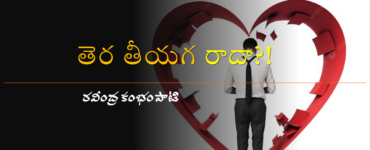Abhayadhamam, Originally written in Kannada by Niranjana this novel was translated into Telugu by Sarvani. Published by M. Seshachalam and & Emesco Pocket Books, October 1973 price 3-50 pages 238
Born in Kulakunda in Mysore district in1923 Niranjana’s real name was K.Sivarao. Author of several well-acclaimed novels like Banasankari, Rangammanavatara, Chirasmarane, he was reputed to have written about 25 novels and published two volumes of short stories in addition to 8 books of essays altogether. He was also a renowned translator of Russian writers like Chekov and Gorky and his own novel Vimochane was translated into Russian and sold over one lakh copies. The Telugu translator of this novel Abhayadhamam was Sarvani whose real name was Saradamma. She was a well-known translator of Kannada novels of writers like Triveni during the previous century into Telugu. She was born (1928) and educated in Kolar district. She translated novels like Vendimabbu, Sarapanjara Apajayam Apaswaram and many more establishing herself firmly as a pioneer in the arena of literary translations. She also contributed short stories, translations as well original, in various Telugu journals of the day like Vipula, Chatura, Jyothi, and Yuva besides a weekly magazine called Andhrapatrika.
Thungamma, a young girl was seen walking at a rather high speed in an effort to walk away as quickly as possible from the house she had been staying for what appeared to be a long time for her. Belonging to a small town she was sent to her father’s student’s house in town to tide over a personal crisis. In her village, she trusts a man who as a distant relative and who often frequented her house. There was even talk of marriage. So blindly trusting him in a moment of weakness she succumbs to temptation and as a result gets pregnant. Her father makes an effort to contact him only to know that he did not have any intention of marrying her. Since like his daughter he also trusted in the goodness of the man and was disappointed he could not bring himself to blame her entirely particularly because she was a motherless child. Fearing society’s ire he sends her out of the town. Thungamma wanted to get away from this obligation and leaves the house as she realises that she would be a burden to the family had she stayed on there. After walking in the middle of the night with little strength due to her advanced pregnancy, but with great grit and determination she reaches the ashram, Abhayadhamam.
Despite her youth, her unrequited love for an unreliable man and subsequent disappointment in her love and her unwanted pregnancy and the hardships thereof one feels admiration for her resolve not to become a burden either to her father, or to his student who gave her shelter and she enters the ashram with trepidation. But one admires the way she endears herself to the inmates and the matron in no time. She became trusted right hand to her matron. She delivers a stillborn baby in due course. When her father comes to take her back, she refuses to go with him and opts to live her life independently obtaining a job which prompts her father and brother also to leave for their village. Thunga settles in Abhayadhamam and becomes one with all the others. She assists the members when they fall sick, she helps her madam in maintaining accounts, she executes efficiently all the purchases for the ashram and organises cultural events in the ashram in the evenings in addition to arranging teaching classes. She gets to know of the sponsors of the ashram and they also develop trust in her. Somasekhar was the nephew of one such sponsor. He observes her and her service-mindedness, gradually a bond develops and it ends in marriage wherein all the inmates the sponsors and her own father attend.
The story ends in a ‘they lived happily ever after’ mood. It appears to be a normal story but there are a few ideas the writer introduces which has an impact on the reader’s mind. In traditional societies girls if they get attracted to any one and develop a relationship it is considered a looseness of character by the society. In this Thunga not only develops a relationship but unfortunately faces untold misery due to her unwanted pregnancy. Her father here comes out as an exemplary person who stands behind her as a pillar of strength. Thunga was a motherless child did not have to guidance and support any watchful mother gives to her daughters. Father who was a middle class school teacher looks after the needs of the children very well but could not realise on time the attachment his daughter getting into with this man known to them all.
To some extent he also trusted the boy as he was first introduced to the family in the marriage of his first daughter. He starts attracting her attention casually but once the marriage was over leaves and comes back into their life much later as an employee in the collectorate. He was thought of as a prospective bridegroom and so when he frequents the house no one was seriously worried. But he seduces her and leaves for his house assuring her that he would talk to his father about the marriage. He never looks back and she was left to fend for herself and face the challenges of unwanted pregnancy. Father sends her out of town and when she shifts to the Abhayadhamam and decides to stay there also he supports her every step of the way. The second male who entered her life was Somasekhar who in a way is a statement of the author that all the men in the world are not crooks and he proposed to marry her and also allowed her to continue the good work she was doing in Abhaydhamam. He gives her a new lease of life by choosing to marry her. Abhayadhamam turns a new leaf in her life.
Written in the times when education was not a regular feature for girls this novel highlights the dangers of unwanted associations for girls and particularly difficult in rural India where the society hardly appreciates these relationships. A girl who comes out of her life’s crisis by her self-will and strength must have been certainly an eye opener for society in the times it was written.
*









Add comment